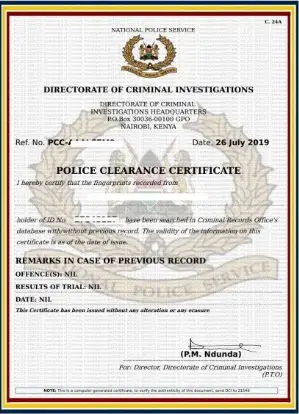Are you a car owner in Kenya looking to part ways with your trusty old vehicle? Perhaps you’re exporting it, it’s been in an unfortunate accident, or it’s just sitting in your backyard gathering dust.
In any case, understanding the de-registration process is crucial. In this article, we’ll dive into the ins and outs of de-registration, share some personal anecdotes, and provide you with all the information you need to make the process a breeze.
Why De-registration Matters
Before we get into the nitty-gritty of de-registration, let’s discuss why it’s such a big deal.
Legal Compliance
First and foremost, de-registration is about adhering to the law. In Kenya, it’s a legal requirement to de-register a vehicle under specific circumstances. Ignoring this can lead to fines and legal trouble down the road.
Tax and Insurance Implications
De-registering your vehicle can have tax and insurance implications. Failing to do so might mean you’re still on the hook for taxes or insurance premiums, even if the vehicle is no longer in your possession. Nobody wants surprise bills!
Peace of Mind
Imagine selling your car to a new owner, only to find out they’ve racked up traffic tickets or worse. Proper de-registration ensures that you’re no longer associated with the vehicle, providing peace of mind.
Now that we understand why de-registration is crucial, let’s explore the circumstances that warrant it.
Circumstances for De-registration
Exporting Motor Vehicles
Exporting a vehicle is an exciting endeavor. It might be heading to a new owner in a neighboring country or even across the globe. When I decided to sell my car to a buyer in a neighboring country, I realized that de-registering it was the responsible thing to do.
Before exporting a vehicle, it must be de-registered in Kenya. This ensures that the vehicle is no longer associated with you, and the new owner can legally register it in their name. Failure to do this can result in complications for both you and the new owner, and nobody wants a hassle at the border!
Accidents and Vehicle Write-offs
Accidents happen, and sometimes, they result in a vehicle that’s beyond repair. This is where the concept of a written-off vehicle comes into play. A few years back, I had a close call on the highway. Thankfully, my car was repairable, but it got me thinking about what would have happened if it had been totaled.
In the unfortunate event that your vehicle is written off due to an accident, it needs to be de-registered. This process helps ensure that the vehicle won’t be resurrected and potentially put back on the road in an unsafe condition. It’s all about safety for you and others on the road.
Unserviceable Vehicles No Longer Needed
Have you ever had a car that just sits there, collecting rust and dust? I certainly have. Maybe it’s a project car that never quite got off the ground, or perhaps it’s simply reached the end of its useful life. If you have a vehicle that’s unserviceable and no longer needed, it’s time to consider de-registration.
De-registering an unserviceable vehicle is a responsible way to remove it from your ownership and prevent it from becoming an eyesore in your yard. Plus, it clears up space for other ventures, like that vegetable garden you’ve been dreaming of.
Requirements for De-registration
Now that we’ve covered when and why you might need to de-register your vehicle let’s delve into the essential requirements. Think of these as your checklist for a smooth de-registration process.
ID and KRA PIN
The Kenyan authorities take identification seriously, and rightfully so. To de-register your vehicle, you’ll need to provide a copy of your ID and your KRA (Kenya Revenue Authority) PIN copy. These documents confirm your identity and tax compliance.
Tape Lift Report
If you’re scratching your head over what a tape lift report is, don’t worry; I was too. Essentially, it’s a report that checks if the vehicle you’re de-registering has any security interest recorded against it. It’s like making sure your car doesn’t have any hidden baggage.
Interpol Letter and Request Letter
An Interpol letter may be required in specific cases. This letter certifies that the vehicle you’re de-registering isn’t wanted for any international legal issues. It’s all about ensuring that you’re not involved in any shady dealings.
Request Letter for De-registration
Additionally, you’ll need a request letter for de-registration, explaining why you’re de-registering the vehicle. Think of this as your formal plea to the authorities.
Original Logbook
The original logbook is like your vehicle’s birth certificate. It proves that you’re the legitimate owner and have the authority to de-register it. Losing this document can be a headache, so keep it safe!
Number Plate Surrender
When you de-register your vehicle, you’ll need to surrender the number plates as well. This prevents anyone else from using them for nefarious purposes, like evading traffic fines or engaging in criminal activities.
Certificate of Incorporation
If your vehicle is owned by a business, you’ll need to provide a certificate of incorporation. This verifies that the business owns the vehicle and has the authority to de-register it. It’s all about keeping things above board.
The De-registration Process
Now that you have all the necessary documents in order, it’s time to navigate the de-registration process. This might seem daunting, but I promise it’s not as complicated as it sounds.
Timelines and Processing
The processing time for de-registration can vary. In some cases, it may be completed relatively quickly, while in others, it might take a bit longer. Factors like the completeness of your documents, the efficiency of the relevant government office, and the complexity of your case can all affect the timeline.
However, it’s essential to stay patient and follow up if necessary. Having all your documents in order from the start can significantly speed up the process.
Consequences of Failure to De-register
So, what happens if you decide to skip the de-registration process or neglect it altogether? Trust me; it’s not a path you want to go down.
Legal Implications
Failing to de-register your vehicle when required by law can lead to fines and penalties. You could find yourself facing legal trouble, which is something none of us want to deal with.
Additionally, you might still be held responsible for any traffic violations or accidents involving the vehicle, even if it’s no longer in your possession. Imagine getting a call about a hit-and-run involving your old car—it’s a headache you can avoid by de-registering properly.
Tax and Insurance Considerations
When you de-register your vehicle, you’re effectively telling the tax authorities that you’re no longer responsible for it. However, if you don’t de-register, you might still be on the hook for taxes and insurance premiums.
For instance, your car might be parked in your garage, unused, but you’re still paying for insurance on it. De-registering ensures that you’re not unnecessarily bleeding money.
Conclusion
De-registering your motor vehicle in Kenya is a necessary step when you’re parting ways with your car for any reason.
Whether you’re exporting your vehicle to new adventures, dealing with the aftermath of an accident, or saying goodbye to an old friend that’s no longer roadworthy, following the de-registration process is the responsible thing to do.
Remember, it’s not just about ticking boxes to comply with the law; it’s also about protecting yourself from potential legal issues and financial burdens down the road. So, gather your documents, visit the relevant authorities, and make the process as smooth as a freshly paved highway.
By following the steps outlined in this guide, you’ll ensure that your vehicle’s legacy ends on a high note, and you can move forward with peace of mind, knowing you’ve handled things the right way. Happy de-registering!



